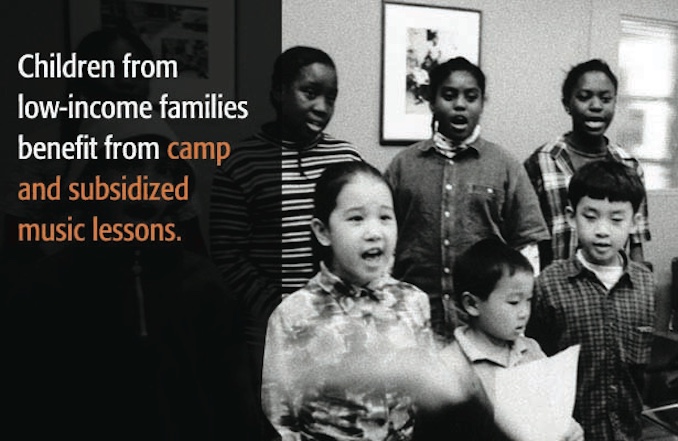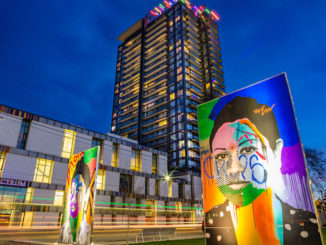
This week I got to chat with the executive director of Dixon Hall, Kate Stark. Dixon Hall is a multi-service agency located in Toronto’s downtown Eastside that offers a wide range of supportive programs and services for the diverse communities it represents. They promote good jobs, good health, safe shelter, vibrant cultures and a strong community primarily for residents of Regent Park, Moss Park, West Donlands, East Bayfront and the surrounding neighbourhoods.
How has your business changed over the years?
Our business has changed in some ways quite significantly and in others not so much. We have served the downtown east side of Toronto since 1929, beginning as a soup kitchen at a significant time of need and now are an agency that provides a range of assistance to people of all ages and experiences. Our size has grown from two staff to over 150 in the past 80 years and our budget from approximately $10,000 annually to $8,000,000 annually. The significant changes we have seen in the past decade are changes such as – in response to the recession more people asking for assistance in the areas of employment support and housing, more people needing assistance in accessing food. More of our clients are presenting with significant challenges including addictions and issues of mental health. Unfortunately with the youth we serve, we see higher incidences of youth dying as a result of violent action by others – this is happening across the City. We see younger and younger children being attracted to unsafe activities that put themselves, their families, and their communities at risk. Again this is happening across the City. Our funding is from all three levels of government and in the past decade the funding has moved away from core funding to project funding, agreements of only one year, rather than ongoing funding. This makes it difficult to plan and respond to community needs. The changes in how we receive government funding have come at the same time as governments have reduced taxation on individuals and corporations. I view this as a move away from investing in our community assets that create safe and healthy community for all of its citizens.
What neighbourhoods do you work with and what type of work do you do there?
Some of the neighbourhoods we work in include Regent Park, Moss Park, West Don Lands,Taylor Massey, Cabbagetown, Corktown, St Lawrence. We provide assistance to seniors living in the community to prevent the need to move into institutional care; we assist unemployed and underemployed individuals looking for work and employers who are looking for employees; we provide shelter for homeless adults, we provide support to individuals and families that help them find and stay in secure housing. We run a well known music school for children and a wood working centre that provides training in basic carpentry skills. We provide health and wellness programs for seniors, children, youth, families, adults and immigrants.
How many people do you work with at a time? Throughout the year?
We interact with about 7,000 individuals a year and the number of people we work with at any one time depends on the service. For instance in our shelters we provide food and overnight stays to as many as 110 people a night. The Out of the Cold program that operates from November to May can serve as many as 250 a night depending on the day of the week. Our Mill Centre can have up to 20 youth engaged. Our youth March break and summer camps can involve as many as 50 children at one time. Our senors programs can have as many as 100 seniors receiving service on any given day. Fifty – 70 people can move through our Employment Service Centre in a day and sometimes it can be as few as 20. The Mandarin Outreach program for families with members of all ages can have events that 100 people attend in an evening for food and celebration.
What age groups do you work with?
We work with all ages – we have a program for single mothers with children under 6 and we provide personal support care to seniors of ages well into their 90s. One of our senior members has been attending the Centre for over 50 years and is approaching 97 years old.
Can you tell us about programs such as Mill Centre, LabourLink or CareerSteps?
Career Steps and LabourLink are no longer offered as services at Dixon Hall. The provincial government decided to change their funding model, moving away from these pre-employment type programs that assisted people with employment training and offered instead Employment Centres that provide assistance to individuals to find work through support in the areas of job search, resume support, job finding , job matching, etc. We were pleased that we were asked to start a new Employment Centre and are running the Dixon Hall Employment Services Centre that provides a full suite of employment services to assist individuals looking for work and employers looking for workers. We can assist individuals interested any type of work – trades, professional, service oriented, etc. and do so through a staff team of 6 experienced employment counsellors. The Centre is accessed by people from all across the City and we work closely with other agencies in the provision of this important service.
How do you find the youth / people that you work with?
Because our youth programs focus on the Regent Park and Moss Park areas, we use word of mouth to find participants. Generally we always have more youth interested in our activities than we can accommodate. Dixon Hall is well known for its effectiveness in working particularly with at risk youth. We operate a youth centre that is seen by our community youth as a safe place to go where there are workers who can assist them with difficult challenging issues in their lives. Our website refers to all our programs and many of our services have promotional materials that are used to attract participants. We network with other organizations and agencies that make referrals to us. Most of our programs run at capacity with wait lists.
Do you work with any other groups or agencies to achieve your goals?
Dixon Hall works with a number of other agencies in all our service areas and we are also involved in many networks, often taking a leadership role in those groups. We are known for our collaborative approach to problem solinvg to assist our communities of service.
What is your biggest challenge?
Our biggest challenge is finding the financial resources that enable us to respond to our community needs in a way that allows us to evaluate, plan and implement programs that are needed and can provide longer term support to our community members.
How can people help?
People can help by making donations of money, time, or expertise. Financial sustainability is our biggest challenge. Most of our programs are underfunded and we annually raise significant program dollars to narrow that gap. In 2012 our fundraising department, supported by our incredible volunteers, raised over $850,000. This year the target is greater to offset the increase in costs, not supported by increased government dollars.
For more information on programs and how to help, visit their website.




